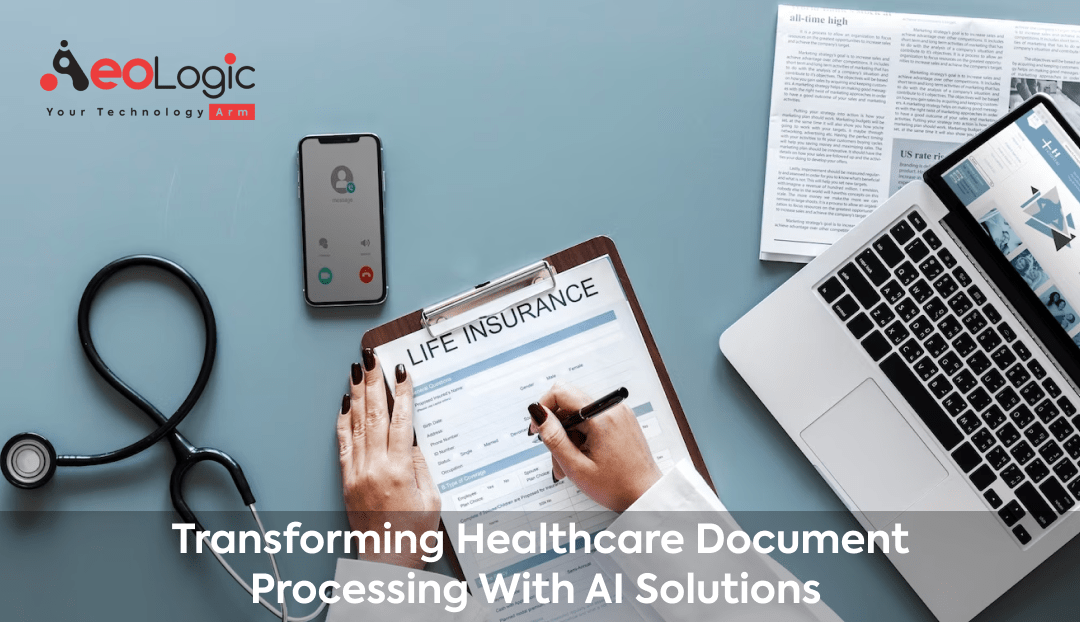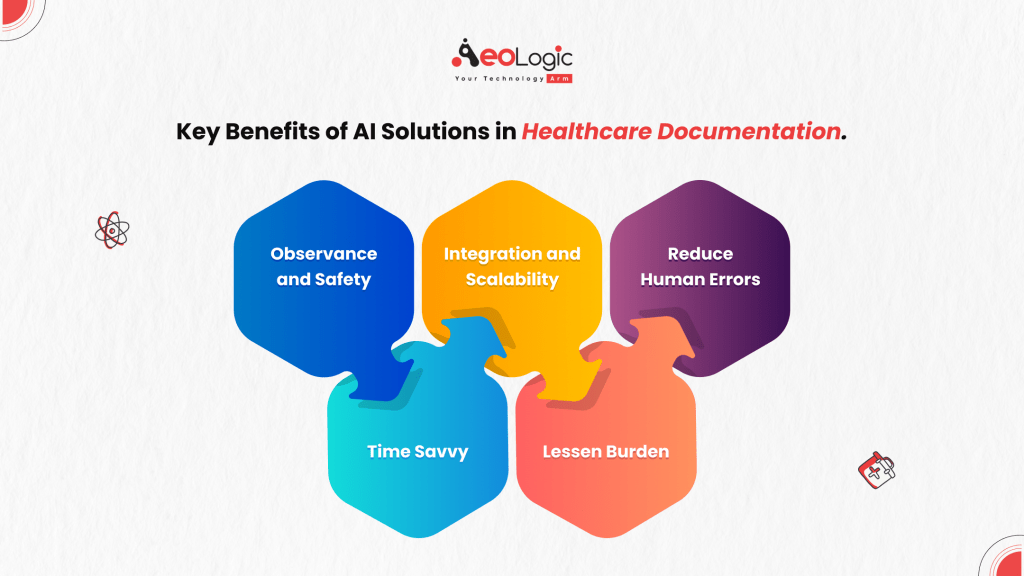Every year, healthcare providers handle a large amount of important patient paperwork, medical records, electronic health records, billing records, insurance claims data, and many other types of paperwork. A manual review is required for all of these data in order to fully understand their contents and relevant context. The provider must invest a significant amount of money in this labor-intensive operation, which takes a long time. In this blog, we discuss about how AI solutions in healthcare revolutionizing documentation processes and where it is changing the world of health services.
Also, papers have been one of the important pillars of the world for hundreds of years as papers are still used in every sector to store data, proof, contracts, commitments, etc. The Healthcare industry is one of the important aspects of human life as there are also documentation processes that occur with the help of papers. But to do the documentation process manually takes a lot of time and effort, and also can be an error in the process. A typical clinician spends nearly two hours each day managing paperwork and it can be exhausting too.
This needs to be enhanced and there is artificial intelligence that can provide solutions to make the documentation process easy in the healthcare industry. Also, the long documentation process is not too good for patients as it leads to late treatment. But artificial intelligence-based solutions can transform the documentation process of the healthcare industry and we will see the explained information about how AI solutions can transform, features, benefits, use cases, etc.
As per the record, the electronic health record market in healthcare is growing at a CAGR of 4.1% from 2023-2030.
Role of AI Solutions in Healthcare Documentation
AI solutions can help to analyze structured and unstructured data from past interactions and negotiations with providers, equipping negotiators with valuable insights for future discussions. AI with the integration with IoT can easily scan the texts and process them to the next step in seconds.
AI solutions can convert the audio of the patient encounter, which is captured by any number of recording devices (and has evolved over the years), to speech, which relies on Natural Language Processing. There are many other ways that AI-based solutions offer to transform document processing in healthcare or any sector.
Also Read: The Role of RFID Technology in Healthcare Industry
Characteristics of AI Solutions in Healthcare
Artificial intelligence has a lot of characteristics that bring enhancement to the paperwork process for healthcare. Here are some of the characteristics of artificial intelligence that have been mentioned.
Data Extraction: Artificial intelligence can extract information such as names, dates, addresses, and other details from documents. This takes a lot of time to write details on a computer system manually whereas AI-based solutions can do this in seconds.
Compliance Adherence: AI-based solutions help in ensuring regulatory compliance by detecting non-compliant documents and flagging anomalies. This helps to avoid the complexity and saves time from wasting on unnecessary information.
Customizable Workflow: The traditional data capture software from documents is technologically limited and would struggle to optimize the data capture whereas artificial intelligence-based solutions software can easily customize and also self-adapt to work in nature.
Security: Artificial intelligence algorithms help to implement security measures to protect the sensitive information contained in the documents. AI solutions also create encryption to the confidential data so no unwanted person can sneak into that.
Also read: The Role of Information Technology in Healthcare
Benefits of AI Solutions for Healthcare
Above mentioned characteristics of AI solutions offer a lot of benefits for the healthcare industry to bring evolution in the documentation process. Here are some of the benefits mentioned below.
Observance and Safety: Keeping up with laws like the Health Insurance Portability and Accountability Act (HIPAA) is essential for healthcare firms since they handle sensitive patient data. By handling and keeping patient data securely, healthcare document automation processing can contribute to compliance. In order to safeguard patient confidentiality and data integrity, it offers audit trails, access limits, and encryption methods. Improved tracking and monitoring of document processing operations is another benefit of automated processes, which makes compliance management easier.
Integration and Scalability: Healthcare firms may manage growing document volumes with automated document processing solutions since they are extremely scalable and don’t require major infrastructure modifications. To facilitate data interchange and increase interoperability, they can be connected with currently in use healthcare systems, such as practice management software or Electronic Health Records (EHR). Data-driven decision-making is made easier and a unified view of patient information is made possible by this integration.
Reduce Human Errors: Artificial intelligence solutions have near-perfect accuracy that can be used in the documentation process to reduce human errors while managing or entering the document’s data on the system manually.
Time Savvy: As mentioned earlier, the documentation process could be a long process when doing it manually. But with artificial intelligence solutions, the documentation process could take up ¼ of manually taken time so AI solutions have the benefit of time saving.
Lessen Burden: The use of AI solutions in the healthcare industry for the documentation process lessens the burden of the employees who give their time and exhaust their minds for documentation. They can use their saved time to do any other critical tasks.
Healthcare organizations can increase compliance, guarantee data accuracy, cut expenses, boost efficiency, and streamline their document processing operations by utilizing intelligent document processing capabilities. In the end, these advantages lead to enhanced overall performance, higher operational effectiveness, and better patient care.
Also Read: Improving Patient Care with RFID Technology in Healthcare
Use Cases of AI Solutions in Documentation Processes for Healthcare Industry
As AI solutions have impressive characteristics and benefits they can have many use cases in the documentation process. Here are some of the use cases mentioned.
Analyze patients record: AI solutions can easily extract the information of patients from the physical documents and can analyze the information provided in the documents. AI solutions make the work easy for doctors as they can summarize the problems of patients based on scanned documents.
For lab results: Most lab test results print on paper an AI solution can process the lab results and make the possible analysis of the diseases based on documents from which data is extracted.
Maintaining database files: There are large files present in the healthcare industry that store the data related to the organization or the patients. AI solutions can easily maintain those files and make virtual files on the computer that can be stored permanently on the cloud.
Implementation of AI solutions in Healthcare
Three steps need to be followed to implement AI solutions in healthcare industry to improve the documentation process. Here are the steps mentioned.
Step 1. Customization: Tailoring the solution to align with the healthcare company’s specific document types, data extraction requirements, and workflow.
Step 2. Integration: Seamlessly integrating AI solutions in healthcare into existing document processing workflow, ensuring minimal disruption and a smooth transition.
Step 3. Training and Adoption: Conduct proper and regular training sessions for the healthcare company’s staff to effectively use and maximize the benefits of AI solutions in their daily documentation process.
Also Read: The Impact of Mobile Apps on Patient Engagement in Healthcare
Challenges For Adapting AI Solutions in Healthcare
There are many advantages of the AI solution for the documentation process but there are also some cons. Here are some of the cons or challenges mentioned.
- Data security sometimes becomes a concern for the healthcare industry as while performing documentation processes with the help of AI solutions, there is a chance of cyberattack.
- The cost of implementation of artificial intelligence is too high as the small healthcare industry can’t afford it.
- Proper knowledge of handling AI is necessary as it takes some time to teach employees how to use artificial intelligence solutions in the documentation process.
Final Words
Artificial intelligence has contributed to many sectors of the world and it can also have the sufficient ability to contribute to the healthcare industry that needs major help to transform the documentation process. AI solutions will surely make the way out of the lengthy documentation process in the future as we have seen the characteristics, benefits, and possible use cases.
But still, AI is too expensive so it can’t be affordable for many healthcare companies but as time passes then it will become affordable. Overall, AI solutions can enhance the documentation process that transforms the healthcare industry in different aspects.
To discover more about how AI solutions in healthcare can revolutionize organizations, connect with Aeologic Technologies.








